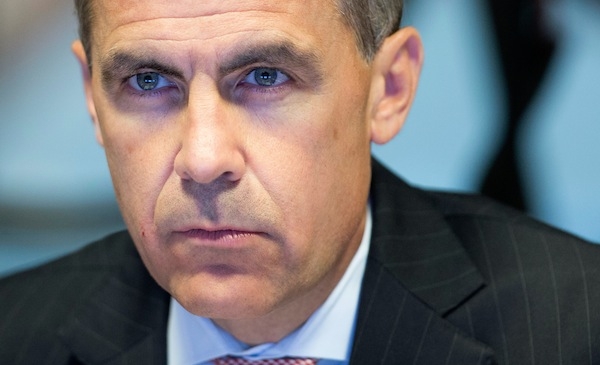Even though Labour is quite clearly rather peeved by George Osborne’s minimum wage announcement, it is, in one way, a compliment to Ed Miliband that the Chancellor felt it strategically important to try to sabotage the Labour leader’s speech on banking, which he will deliver shortly. The Conservatives are aware that even if Miliband has a knack of coming up with policies that sound potty, he also has a knack of framing them in a way that disrupts the political debate. Thus a pledge by a party leader in the autumn to control prices in a market where he has no control of worldwide wholesale markets still managed to cause significant trouble.
It is significant this morning that Labour is trying to tussle with Mark Carney, who earlier this week dismissed talk of a bonus cap and breaking up the banks. Chuka Umunna popped up on the BBC to complain that Bank of England governors shouldn’t be involved in ‘big political debates’. He said:
‘I think it’s not healthy for us to involve governors of the Bank of England in big political debates and I don’t want to drag him into that. He was asked a leading question by a Conservative MP who put it to him whether crude caps on the share of a market that banks have are a good thing or not. We’re not proposing a crude or arbitrary market cap, we’re proposing something that would be set by the Independent Competition and Markets Authority.
‘But I actually had an exchange in July 2010 with Mark Carney’s predecessor, Sir Mervyn King, and he made it very clear to me that its not a good thing for governors in the Bank of England to be involved in political matters.’
Carney was Osborne’s hire, so Labour isn’t being unduly paranoid in worrying that the Bank of England governor is more impressed with the current Chancellor than he is with anything the Opposition is putting out. But aside from the Governor’s reluctance to appear enthusiastic at the prospect of a Miliband government, there is a bigger challenge for the Labour leader which he knows he needs to address today.
Talking about the need to reform banks is by no means a bad subject, but Miliband is trying to do it as part of his ‘relentless focus’ on the cost of living. His challenge is to try to link the big, long-term reforms that he will be talking about today to this narrative. Talking about a long-term plan that will in time relieve the pressure on the cost of living is precisely the method the Conservatives use to wrong-foot the Labour leader: if he can’t do that himself in a way that is as tangible as the ‘hard truths’ narrative that George Osborne has set up, then he’ll have more immediate things to worry about than whether he’d get on with Mark Carney once in power.







Comments